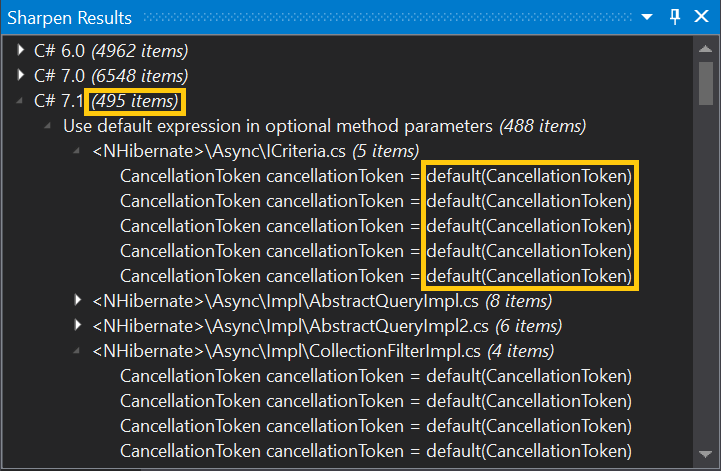Sharpen v0.2.0 - Default Expressions in Action
Defining Sharpen’s Release Priorities
Defining Sharpen’s release and feature priorities is not going to be an easy task. That fact was clear to me from the very first day I started working on Sharpen. In this early stage of the project literally every feature is equally needed and equally important:
- Adding more analyzers to get suggestions for more C# language features.
- Providing recommendations for those suggestions. Without recommendations, Sharpen will hardly differ from other static analysis tools that blindly suggest usage of a feature, just because it can be used.
- Creating built-in C# documentation. Learning is, after all, Sharpen’s main purpose!
- Implementing refactoring. The fact that 10,000+ places in my code would benefit of a new C# feature only frustrates me, if I cannot apply those feature automatically.
- Building a state-of-the art UX. Displaying thousands of results in a single tree view is fine for the moment but definitely not satisfying even on a mid-term.
And these are just a few of the major development directions.
Luckily, in this very early stage of the project I can simplify the prioritization process. At the moment I primarily focus on those features that will help make my talk on Losing Weight With C# 7+ as practical and tangible as possible. And thus, the release 0.2.0, following my talk, fully focus on adding analyzers for C# 7.1 default expressions.
Default Expressions
So, Sharpen v0.2.0 is there, available for download on the Visual Studio Marketplace :-)
It brings three new suggestions, namely:
- Use default expression in optional constructor parameters
- Use default expression in optional method parameters
- Use default expression in return statements
These are in practice the three most prominent places where the default values are used.
As always I was curious of the findings in the real-life code. And for sure (this time without a surprise) there were many findings worth showcasing. Just to give you a glimpse of the new feature, here are the default expression related findings in the NHibernate code:

Here is on of the interesting findings. Async methods in NHibernate follow the usual pattern of accepting an optional CancellationToken parameter. And since the CancellationToken is a struct, the only way to provide the default value, prior to C# 7.1, was to write default(CancellationToken). With C# 7.1 this simply narrows down to default. I would personally love to see NHibernate’s code loosing a bit of weight in this area :-)
This is just one of several interesting findings related to default expressions. I plan to share generally interesting Sharpen findings via a series of blog posts called “Sharpen Weekly”. Stay tuned ;-)
Release Content
You can see the official release notes for the version 0.2.0 on GitHub.Download Sharpen v0.2.0 from the Visual Studio Marketplace and give it a try on your own. I’m curious how interesting your findings will be :-)
Improve this page